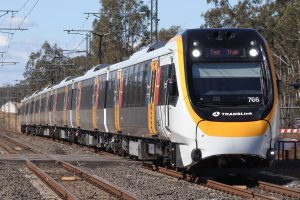Australian state governments and private companies are having to review contracts with foreign companies amid allegations that they may be sourcing materials produced in factories using forced labor in China.
Queensland’s Transport and Main Roads Minister Mark Bailey directed his department last week to review whether the state’s New Generation Rollingstock (NGR) trains contain parts produced in Xinjiang, China, where experts estimate more than a million Uyghurs and members of other Turkic Muslim minorities have disappeared into a vast network of “re-education camps” in recent years.
The Queensland government has an ongoing relationship with KTK, a company that the U.S. government blacklisted earlier this month, after finding it was implicated in human rights violations, such as forced labor in Xinjiang. KTK Australia said in a statement that the allegations “are based on no official documents, interviews or testimony.”
But a recent report by the Australian Strategic Policy Institute (ASPI) found mounting evidence that many Uyghurs — following months, if not years, of political indoctrination, forced renunciation of their religion and culture, and even torture — are then being transferred from Xinjiang to factories across the country, including factories operated by KTK.
KTK also has ongoing contracts with the Victorian and New South Wales governments.
The ASPI report also named Hubei Haixin Protective Products Group Co Ltd, which has continued to sell face masks to Australia throughout the pandemic. Around the same time that Victorian authorities mandated masks be worn in public, reports emerged that as many as 200,000 masks produced by Hubei Haixin had entered the Australian market.
The state-run Hubei Daily newspaper reported earlier this year that the company, in agreement with the Chinese government, had transported 131 Uyghur women aged 19 to 31 from their home in Xinjiang to the company’s factory in Hubei by train, a distance of more than 3,200 km.
Overall, the ASPI report identified 27 factories in nine Chinese provinces that are using Uyghur labor and found that many of the factories claim to be part of the supply chain of 83-well known global brands, including Adidas, Apple, Microsoft, Google, Huawei, Nike, Mitsubishi, Sony, Volkswagen, and Zara.
Last year, an investigation by the ABC revealed that retailers in Australia including Target, Cotton On, Ikea, and H&M had sourced cotton in Xinjiang and detailed links between Australian universities and Chinese tech companies overseeing the surveillance apparatus monitoring Uyghurs.
In a statement responding to the revelation of state governments sourcing material from companies using forced labor, a spokesperson for the Department of Home Affairs said that procurements were a matter for state and territory governments and had nothing to do with the federal government.
“The Australian government encourages state and territory government to take action to respond to modern slavery risks in their supply chains,” the statement said. “The Modern Slavery Act 2018 requires the Australian government and Australian businesses to publicly account for how they respond to modern slavery risks in global operations and supply chains.”
But the federal government has also come under scrutiny for its dealings with Chinese companies. In April, the federal government accepted 10 million COVID-19 tests manufactured by the Beijing Genomics Institute (BGI), a company that some reports suggest has provided gene technology to Chinese police for surveillance of Uyghurs in Xinjiang.
Just last week the U.S. Department of Commerce added BGI to an Entity List in connection with “conducting genetic analyses used to further the repression of Uyghurs and other Muslim minorities.”
Vicky Xiuzhong Xu, the author of the ASPI report, told the ABC that she believed the way both the federal and state governments responded to this issue was a test of Australia’s commitment to human rights.
“An investigation into KTK Group and their contracts with Australian state governments is overdue,” she said. “But I think given the response from the United States, we are looking to see and test if Australia’s modern slavery act will be able to protect us from slave labor and do what it says, which is to safeguard our values on human rights.”































